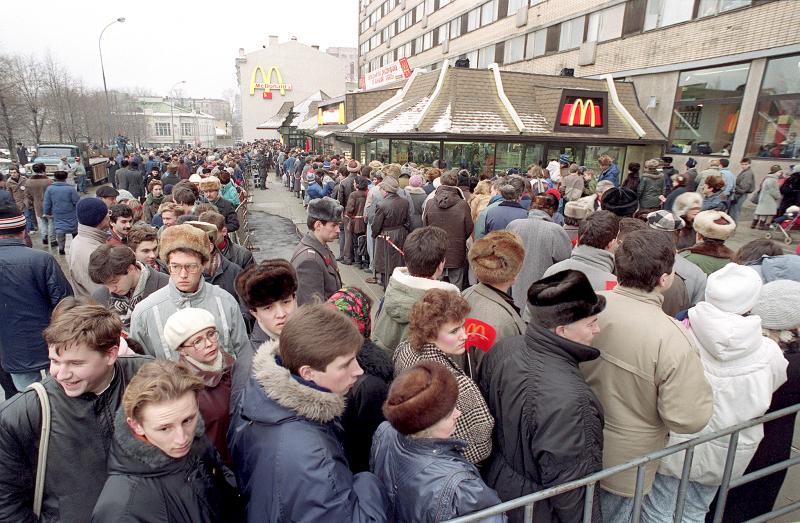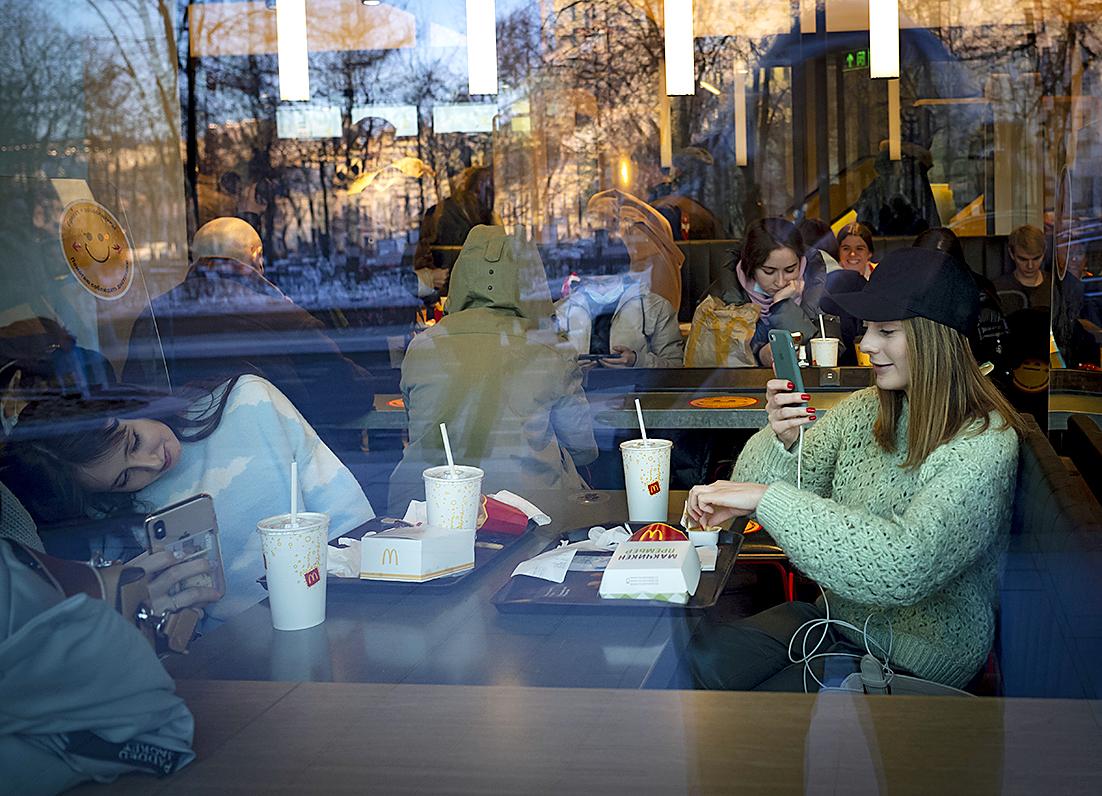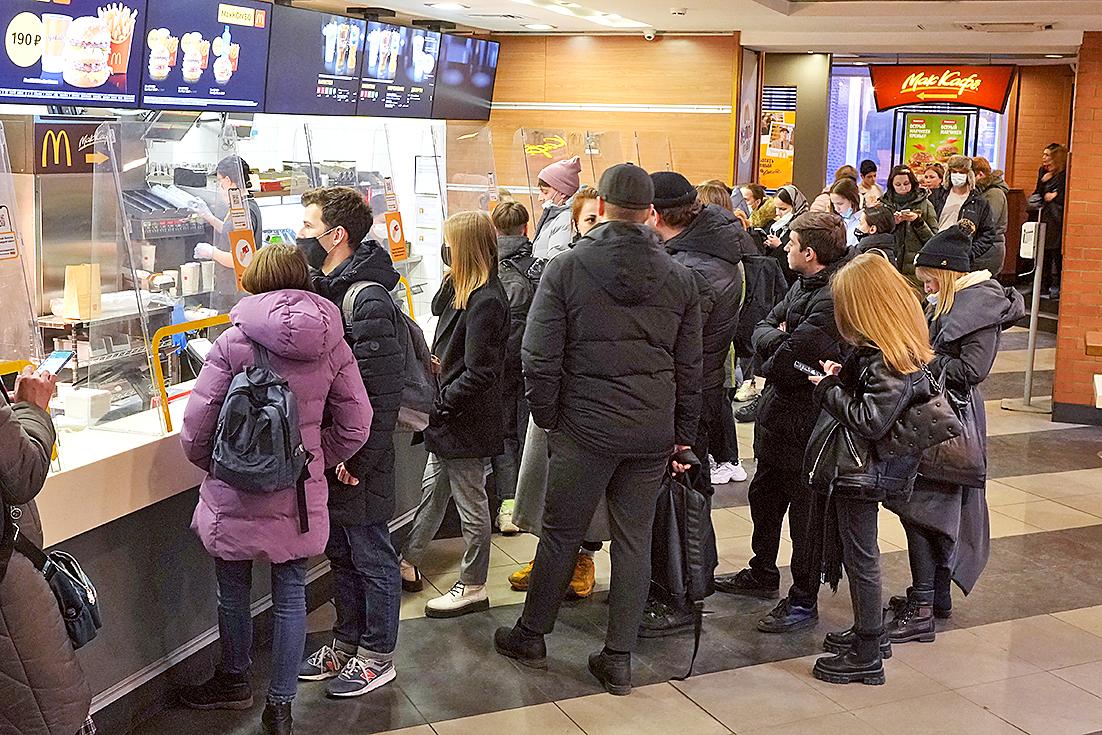Two months after the Berlin Wall fell, another powerful symbol opened its doors in the middle of Moscow: a gleaming new McDonald’s.
It was the first American fast-food restaurant to enter the Soviet Union, reflecting the new political openness of the era. For Vlad Vexler, who as a 9-year-old waited in a two-hour line to enter the restaurant near Moscow’s Pushkin Square on its opening day in January 1990, it was a gateway to the utopia he imagined the West to be.
“We thought that life there was magical and there were no problems,” Vexler said.

Photo: AP
So it was all the more poignant for Vexler when McDonald’s announced it would temporarily close that store and nearly 850 others in response to Russia’s invasion of Ukraine.
“That McDonald’s is a sign of optimism that in the end didn’t materialize,” said Vexler, a political philosopher and author who now lives in London. “Now that Russia is entering the period of contraction, isolation and impoverishment, you look back at these openings and think about what might have been.”
McDonald’s said in a statement that, “At this juncture, it’s impossible to predict when we might be able to reopen our restaurants in Russia.”

Photo: AP
But it is continuing to pay its 62,500 Russian employees. The company said this week that it expects the closure to cost around US$50 million per month.
Outside a McDonald’s in Moscow last week, student Lev Shalpo bemoaned the closure.
“It’s wrong because it was the only affordable place for me where I could eat,” he said.

Photo: AP
Just as McDonald’s paved the way for other brands to enter the Soviet market, its exit led to a cascade of similar announcements from other US brands. Starbucks closed its 130 outlets in Russia. Yum Brands closed its 70 company-owned KFC restaurants and was negotiating the closure of 50 Pizza Huts that are owned by franchisees.
McDonald’s entry into the Soviet Union began with a chance meeting. In 1976, McDonald’s loaned some buses to organizers of the 1980 Moscow Olympics who were touring Olympic venues in Montreal. George Cohon, then the head of McDonald’s in Canada, took the visitors to McDonald’s as part of the tour. That same night, the group began discussing ways to open a McDonald’s in the Soviet Union.
Fourteen years later, after Soviet laws loosened and McDonald’s built relationships with local farmers, the first McDonald’s opened in downtown Moscow. It was a sensation.
On its opening day, the restaurant’s 27 cash registers rang up 30,000 meals. Vexler and his grandmother waited in a line with thousands of others to enter the 700-seat store, entertained by traditional Russian musicians and costumed characters like Mickey Mouse.
“The feeling was, ‘Let’s go and see how Westerners do things better. Let’s go and see what a healthy society has to offer,’” Vexler said.
Vexler saved money for weeks to buy his first McDonald’s meal: a cheeseburger, fries and a Coca-Cola. The food had a “plasticky goodness” he had never experienced before, he said.
Eileen Kane visited the original McDonald’s often in 1991 and 1992 when she was an exchange student at Moscow State University. She found it a striking contrast from the rest of the country, which was suffering frequent food shortages as the Soviet Union collapsed.
“McDonald’s was bright and colorful and they never ran out of anything. It was like a party atmosphere,” said Kane, who is now a history professor at Connecticut College in New London, Connecticut.
McDonald’s entry into the Soviet Union was so groundbreaking it gave rise to a political theory. The Golden Arches Theory holds that two countries that both have McDonald’s in them won’t go to war, because the presence of a McDonald’s is an indicator of the countries’ level of interdependence and their alignment with US laws, said Bernd Kaussler, a political science professor at James Madison University in Harrisonburg, Virginia.
That theory held until 2014, when Russia annexed Crimea, Kaussler said.
Kaussler said the number of countries now withdrawing from Russia, and the speed with which they acted, is unprecedented. He thinks some, including McDonald’s, might calculate that it’s unwise to reopen, which would leave Russia more isolated and the world less secure.
“As the Russian economy is becoming less interdependent with the U.S. and Europe, we basically have fewer domestic economic factors that could mitigate current aggressive policies,” Kaussler said.
Vexler said the admiration for the West that caused Russians to embrace McDonald’s three decades ago has also shifted. Russians now tend to be more anti-Western, he said.
Anastasia Chubina visited a McDonald’s in Moscow last week because her child wanted one last meal there. But she was indifferent about its closure, suggesting Russians will get healthier if they stop eating fast food.
“I think we lived without it before and will live further,” she said.
Entrepreneur Yekaterina Kochergina said the closure could be a good opportunity for Russian fast-food brands to enter the market.
“It is sad, but it’s not a big deal. We’ll survive without McDonald’s,” she said.

Last week, on the heels of the recall election that turned out so badly for Taiwan, came the news that US President Donald Trump had blocked the transit of President William Lai (賴清德) through the US on his way to Latin America. A few days later the international media reported that in June a scheduled visit by Minister of National Defense Wellington Koo (顧立雄) for high level meetings was canceled by the US after China’s President Xi Jinping (習近平) asked Trump to curb US engagement with Taiwan during a June phone call. The cancellation of Lai’s transit was a gaudy

Following the shock complete failure of all the recall votes against Chinese Nationalist Party (KMT) lawmakers on July 26, pan-blue supporters and the Chinese Communist Party (CCP) were giddy with victory. A notable exception was KMT Chairman Eric Chu (朱立倫), who knew better. At a press conference on July 29, he bowed deeply in gratitude to the voters and said the recalls were “not about which party won or lost, but were a great victory for the Taiwanese voters.” The entire recall process was a disaster for both the KMT and the Democratic Progressive Party (DPP). The only bright spot for

From Godzilla’s fiery atomic breath to post-apocalyptic anime and harrowing depictions of radiation sickness, the influence of the nuclear bombings of Hiroshima and Nagasaki runs deep in Japanese popular culture. In the 80 years since the World War II attacks, stories of destruction and mutation have been fused with fears around natural disasters and, more recently, the Fukushima crisis. Classic manga and anime series Astro Boy is called “Mighty Atom” in Japanese, while city-leveling explosions loom large in other titles such as Akira, Neon Genesis Evangelion and Attack on Titan. “Living through tremendous pain” and overcoming trauma is a recurrent theme in Japan’s

As last month dawned, the Democratic Progressive Party (DPP) was in a good position. The recall campaigns had strong momentum, polling showed many Chinese Nationalist Party (KMT) lawmakers at risk of recall and even the KMT was bracing for losing seats while facing a tsunami of voter fraud investigations. Polling pointed to some of the recalls being a lock for victory. Though in most districts the majority was against recalling their lawmaker, among voters “definitely” planning to vote, there were double-digit margins in favor of recall in at least five districts, with three districts near or above 20 percent in